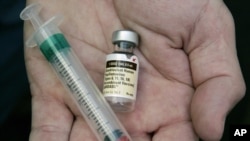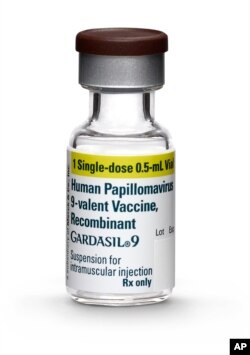The HPV vaccine is the first that directly addresses sexual and reproductive health.
Cervical cancer ranks as the second most frequent cancer among women in Namibia and is the third most frequent among women between the ages of 15 and 44. Nearly all cervical cancers are linked to genital infection with HPV – the human papillomavirus.
Namibian health authorities see the vaccine as necessary to combat sexually transmitted infections, which are quite common.
Namibia's plans to offer the vaccine were delayed by the COVID pandemic, so the shots will be rolled out next year.
Women's health and social entrepreneur Nevelline Amuenje says HPV vaccinations do not treat the virus but can prevent infection.
She told VOA Africa that HPV is common in both women and men. Most people will contact HPV at least once in their lifetime, which the body can clear out, but sometimes it can lead to the development of cancerous cells.
"HPV vaccines," she said, "can prevent infection with certain types of HPV including types that are linked to HPV-related cancers as well as types that are linked to anal and genital warts.
"Vaccines are approved for use in males and females. They can only be used to prevent HPV infection. They do not help treat an existing infection which is important to note."
The First Lady of Namibia, Monica Geingos, has been mobilizing efforts across Africa to bring HPV vaccines to adolescent girls. Geingos also is the president of the Organization of African First Ladies.
She says in Africa, cervical cancer is a major health concern for women, representing 20 percent of all cancers diagnosed among them, coming in only second to breast cancer.
"We are left with no choice but to do things differently," she said.
"Reducing the number of women who die of cervical cancer has always been urgent. It makes no sense that the cervical cancer disease burden continues to exist while cervical cancer is probably the only truly preventable cancer."
"The scaling up of prevention for both HIV and HPV programs needs new and innovative approaches. There is the real risk in losing ground in gains made but there is also the real opportunity in sustaining them."
Speaking at a recent event, the acting executive at the Ministry of Health, Taimi Aamambo, said the roll out will be more complex compared with the immunizations against rubella and tetanus, which are administered to infants.
In 2011, Rwanda became the first country on the continent to introduce the HPV vaccine. It has achieved a 98 percent vaccination rate through its school-based program. South Africa introduced the HPV vaccine in 2014, and it was introduced in Burkina Faso in April 2022.








Forum